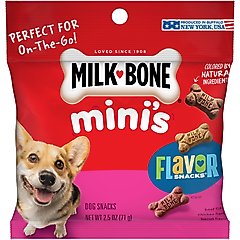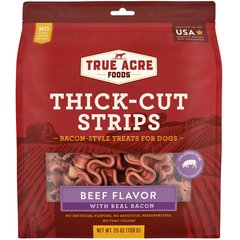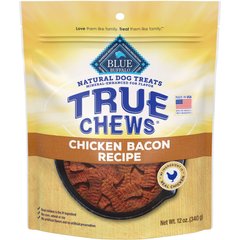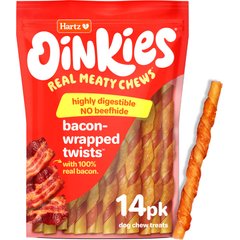Can Dogs Eat Bacon?
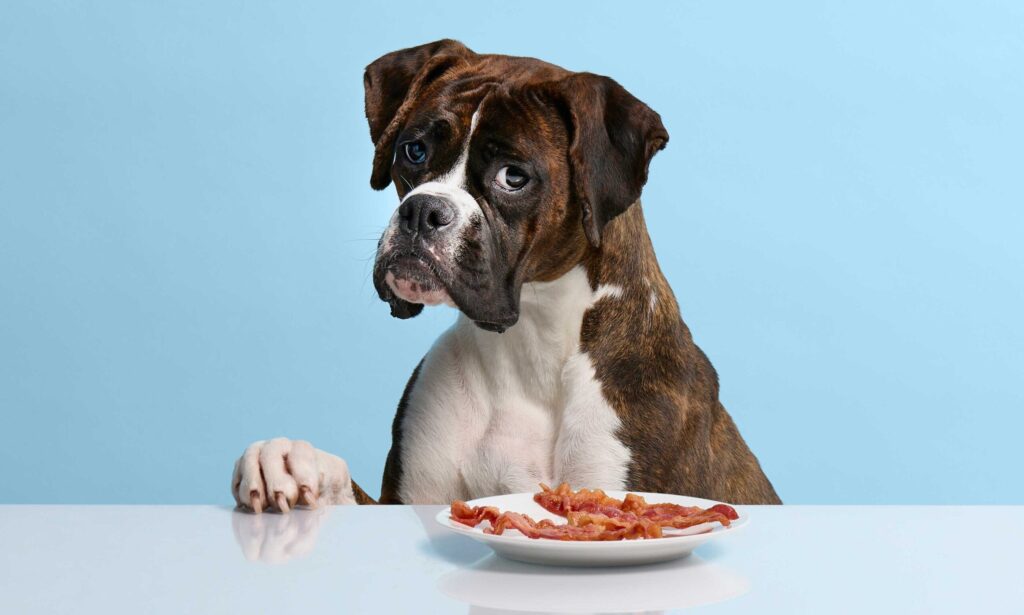
Photo by Chewy
There’s no denying it: The mouth-watering scent of bacon sizzling in a pan can make even the most disciplined of us drool. As those tantalizing aromas waft through the air, our canine companions are often the first to appear, gazing longingly at the crispy strips. But can dogs eat bacon?
We hate to go “bacon” your dog’s heart, but these sizzling strips are off-limits. Here’s why—and what to do if your dog eats too much.
Key Takeaways
- Bacon is not safe for dogs due to its high fat, salt, and additive content.
- Eating bacon can cause digestive issues and increase the risk of pancreatitis in dogs.
- A small amount of bacon likely won’t harm your dog, but large amounts can be dangerous.
- Opt for dog-friendly bacon-flavored treats instead of sharing your own breakfast bacon.
Why Is Bacon Bad for Dogs?
Here are the top reasons why you shouldn’t give your dog bacon:
High Fat Content
Bacon’s salt content is much higher than what dogs require. A sudden surge in salt intake can throw off a dog’s electrolyte balance.
Symptoms such as increased thirst and urination are only the tip of the iceberg. In more severe instances, dogs can face sodium ion poisoning, a potentially life-threatening condition with symptoms such as tremors, high fever, and seizures.
Harmful Preservatives and Additives
Today’s commercial bacon is more than just meat; it’s often laced with a cocktail of preservatives and additives to prolong shelf life and enhance flavor. Among these, sodium nitrites stand out as particularly concerning.
Ingested in large quantities, these compounds can be toxic to dogs and lead to a range of health issues, from an upset stomach to a blood disorder called methemoglobinemia.
Digestive Upsets
Dogs’ digestive systems are designed differently than ours: Foods that we might handle with ease can wreak havoc on a canine’s gut. The richness and fatty composition of bacon can lead to immediate gastrointestinal disturbances, causing diarrhea, vomiting, and general discomfort.
My Dog Ate Too Much Bacon—What Do I Do?
Bacon is not inherently toxic to dogs, so if your dog stole a small piece of bacon or even a whole piece, there’s likely no need to worry.
However, if your dog ingested multiple slices of bacon, there could be cause for concern. In this case, it’s important to keep an eye on your pup, watching for the following symptoms:
- Vomiting
- Diarrhea
- Lethargy
- Decreased appetite
If these symptoms or any others occur, contact your veterinarian immediately for guidance.
Feeding your dog lightly for a day following “the bacon incident” may also be wise, to help prevent further gastrointestinal distress.
Bacon Treats To Give Your Dog
While feeding your dog strips of bacon should be avoided, there’s no need to deprive them of that savory taste they crave.
Lots of dog-friendly bacon treats are available that provide that bacon-y goodness without the associated risks. Here are a few tail-wagging options to try:
Recommended Products
FAQs About Bacon and Dogs
Can dogs have raw bacon?
No, dogs should not consume raw bacon or any other forms of raw pork. Raw bacon can contain harmful bacteria like salmonella, which can cause food poisoning.
Can dogs have bacon fat?
While a small amount of bacon fat or bacon grease isn’t immediately harmful to dogs, it’s not recommended due to its high fat content.
Can dogs have turkey bacon?
Turkey bacon is leaner than traditional pork bacon, but it’s still processed and can contain high levels of salt and additives. As a very occasional treat, you can give your dog a few small pieces of low-sodium, uncured, cooked turkey bacon without seasonings.
Can dogs have pork?
While bacon (made from pork) is off-limits, dogs can occasionally have small amounts of well-cooked lean pork as a treat. However, it should be unseasoned and free from sauces or gravies. Ensure it’s cooked thoroughly to eliminate any harmful pathogens. Pork that’s found in dog food and dog treats is also OK.
Can dogs have ham?
No, you should not give your dog ham. While ham isn’t toxic to dogs, it’s typically high in salt, fat, sugar and preservatives, all of which pose health risks to dogs when consumed in large amounts.
While the aroma of bacon might smell heavenly to your furry friend, keep your dog’s health a top priority and don’t give him this food. Fortunately, there are several drool-worthy human foods that dogs can enjoy in moderation, such as fruits and veggies and various types of seafood.
Attributions
Expert info provided by Danielle (Rutherford) McArthur, VMD, a veterinarian at Westside Veterinary Center in New York.
